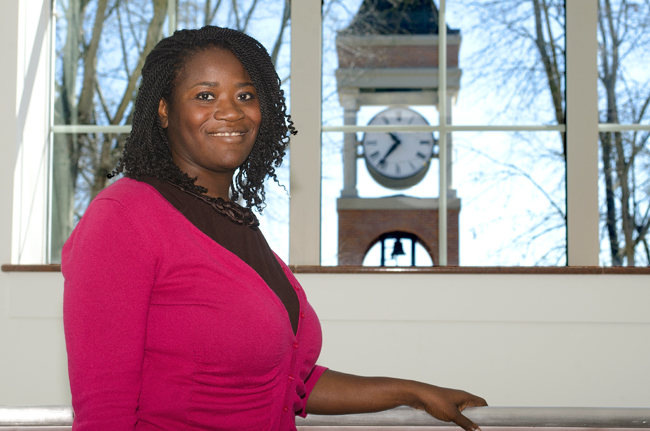Doctoral Student�s Research Strives To Understand Campus Violence
March 11, 2013
SHSU Media Contact: Jennifer Gauntt
Story by: Kim Kyle Morgan

As a teenager in Colorado Springs, Stephanie Bluth recalls the horror of a mass shooting in Columbine at a school just 45 minutes away from her own.
In 2002, when Bluth was a young woman studying social welfare and criminology at Adams State University in Colorado, a student shot and killed three professors at the University of Arizona.
In 2007, three years after Bluth earned a master's degree in counseling from Adams State, a gunman opened fire and killed more than 30 people at Virginia Tech, which became known as the worst act of violence since a 1966 homicidal rampage at the University of Texas that killed 16 people.
Today, as a doctoral student in counselor education at Sam Houston State University, Bluth is more aware than ever of threatening encounters on what used to be safe ground.
"This is the most violence college campuses have seen since the Civil Rights movement," Bluth said. "So there must be something going on with this generation. What is it? Why is this happening?"
But Bluth also wants to know why Generation Y, also known as the “Millennial Generation,” is unlikely to get involved when danger unfolds.
"A gunman at Texas A&M walked from one side of the campus to the other with a semi-automatic rifle, and not one person called campus police," Bluth said. "The shooter at University of Texas at Austin had parked his car in a garage, passed three video cameras and walked by at least 15 people—but the police weren't notified until he was in the fire the first shot."
Bluth is attempting to get to the heart of the matter via her doctoral dissertation, Bystander Intervention and Violence Prevention in Higher Education.
"Millennial students are an immediate gratification-driven generation, and because of that they don't always think about the consequences of their actions," Bluth said. "Bystander intervention tries to turn that around. It teaches social policing and being vigilant. It teaches that you're always a witness to something, and, as such, you should be able to show a conscious effort to protect those around you.
"When you see a gunman on campus, call 9-1-1 instead of getting in your car and driving away, only thinking about yourself. If you hear a girl screaming from another room, don't assume she's OK. She might be being raped."
Bluth's dream is to implement bystander intervention on college campuses across the nation, requiring groups such as sororities and fraternities to undergo training.
"If you want to be part of a collective group, make it a positive collective that impacts your society, which in this case is the college campus," Bluth said.
Bluth's research has earned her a "2013 Emerging Scholar Leader" award from the American College of Counseling Association, given to only four recipients this year. Bluth, the only Texan among the group, said she's the first recipient from SHSU, where she's also currently the director of academic communications in the Graduate Studies Office.
"It's exciting because it means my research is being looked at by scholars from around the U.S.," said Bluth, who will present her work at the American Counseling Association national convention in Cincinnati. "It also means I have the privilege of producing a research article for publication in an ACCA peer-reviewed journal."
It's indeed quite the accomplishment for Bluth, who knew from an early age that she wanted to be involved in some type of social work.
"My dad was always finding ways to show us that just because we were taken care of didn't mean every child in the world is taken care of," Bluth said. "My parents are both ex-military, from the Army, so we grew up learning 'it's our country, we take care of it.' It was instilled in me from a young age."
Bluth has been a case supervisor for Child Advocates of Montgomery County, a conservator specialist for the Department of Family and Protective Services in Houston, and a community education specialist for Montgomery County Youth Services.
All of these experiences have led her to where she is today.
"When I worked with homeless teenagers, those in foster care, I saw how they would bond with each other but didn't trust adults," Bluth said. "Kids who grow up on the street protect each other. They would rather stay in their group and be homeless than be individually placed.
"It's the same thing among college students—they stick together; on a college campus, we call them sororities, fraternities, athletes, jocks…there are still cliques,” she said. “My goal is to make college students understand that no matter what your subgroup is, you're all a community. By becoming involved in your community, we can prevent violence before it even happens."
Bluth worries that if campus violence continues, it will become the accepted norm.
"I don't want that for anybody," said Bluth, who is the mother of a 4-year-old daughter. "I dream of a peaceful coexistence on college campuses."
- END -
This page maintained by SHSU's Communications Office
Associate Director: Julia May
Manager: Jennifer Gauntt
Located in the 115 Administration Building
Telephone: 936.294.1836; Fax: 936.294.1834
Please send comments, corrections, news tips to Today@Sam.edu.

 SamWeb
SamWeb My Sam
My Sam E-mail
E-mail

